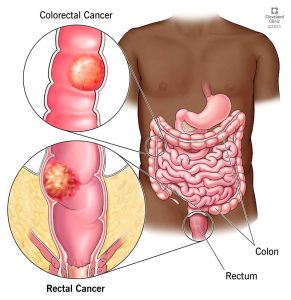Rectal Cancer Treatment
Rectal cancer treatment often involves a combination of therapies. When possible, surgery is used to cut away the cancer cells. Other treatments, such as chemotherapy and radiation therapy, may be used after surgery to kill any cancer cells that remain and reduce the risk that cancer will return.

Surgery
Rectal cancer is often treated with surgery to remove the cancer cells. Which operation is best for you depends on your particular situation, such as the location and stage of your cancer, how aggressive the cancer cells are, your overall health, and your preferences.
Operations used to treat rectal cancer include:
- Removing very small cancers from the inside of the rectum. Very small rectal cancers may be removed using a colonoscope or another specialized type of scope inserted through the anus (transanal local excision). Surgical tools can be passed through the scope to cut away the cancer and some of the healthy tissue around it.This procedure might be an option if your cancer is small and unlikely to spread to nearby lymph nodes. If a lab analysis finds that your cancer cells are aggressive or more likely to spread to the lymph nodes.
- Removing all or part of the rectum. Larger rectal cancers that are far enough away from the anal canal might be removed in a procedure (low anterior resection) that removes all or part of the rectum. Nearby tissue and lymph nodes are also removed. This procedure preserves the anus so that waste can leave the body normally.How the procedure is performed depends on the cancer’s location. If cancer affects the upper portion of the rectum, that part of the rectum is removed and then the colon is attached to the remaining rectum (colorectal anastomosis). All of the rectum may be removed if the cancer is located in the lower portion of the rectum. Then the colon is shaped into a pouch and attached to the anus (coloanal anastomosis).
- Removing the rectum and anus. For rectal cancers that are located near the anus, it might not be possible to remove the cancer completely without damaging the muscles that control bowel movements. In these situations, surgeons may recommend an operation called an abdominoperineal resection (APR) to remove the rectum, anus and some of the colon, as well as nearby tissue and lymph nodes.The surgeon creates an opening in the abdomen and attaches the remaining colon (colostomy). Waste leaves your body through the opening and collects in a bag that attaches to your abdomen.
